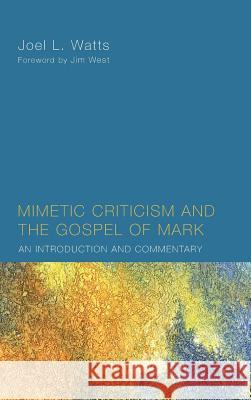Mimetic Criticism and the Gospel of Mark » książka
Mimetic Criticism and the Gospel of Mark
ISBN-13: 9781498264297 / Angielski / Twarda / 2013 / 266 str.
Mimetic Criticism and the Gospel of Mark
ISBN-13: 9781498264297 / Angielski / Twarda / 2013 / 266 str.
(netto: 187,72 VAT: 5%)
Najniższa cena z 30 dni: 196,56
ok. 16-18 dni roboczych.
Darmowa dostawa!
Description: What if the story of Jesus was meant not just to be told but retold, molded, and shaped into something new, something present by the Evangelist to face each new crisis? The Evangelists were not recording a historical report, but writing to effect a change in their community. Mark was faced with the imminent destruction of his tiny community--a community leaderless without Paul and Peter and who witnessed the destruction of the Temple; now, another messianic figure was claiming the worship rightly due to Jesus. The author of the Gospel of Mark takes his stylus in hand and begins to rewrite the story of Jesus--to unwrite the present, rewrite the past, to change the future. Joel L. Watts moves the Gospel of Mark to just after the destruction of the Temple, sets it within Roman educational models, and begins to read the ancient work afresh. Watts builds upon the historical criticisms of the past, but brings out a new way of reading the ancient stories of Jesus, and attempts to establish the literary sources of the Evangelist. Endorsements: ""Finally A work that recognizes how truly revolutionary and deeply reflective the gospel of Mark was and is. Watts puts forth a bold first step."" --Anthony Le Donne, University of the Pacific ""The newest element in the periodic table of scholarly tools, highly unstable and liable to cause reactions, mimetic criticism gets a detailed methodological exploration in this book, followed by a similarly detailed application to the gospel of Mark. . . . At times, his way of expressing things, like Mark's, seems rough and unpolished. I suspect Watts did this intentionally, just as he argues Mark did, and the translators of the Septuagint before him. For at the end of the book, Watts indicates he has written seriously yet playfully, aiming not merely to discuss mimesis but to illustrate it. All in all, a fascinating book, bound to generate fruitful and illuminating discussion."" --James F. McGrath, Butler University ""Watts' study of Mark's gospel offers bold and thought-provoking claims regarding issues of method, historicity, and literary theory--claims that deserve consideration and will no doubt elicit responses from many in the field of New Testament studies. Standing upon such claims is an anti-imperial reading of Mark's gospel that builds on the work of others, but also advances previous readings through original and creative interaction with both Greco-Roman history and literature."" --Adam Winn, University of Mary Hardin-Baylor About the Contributor(s): Joel L. Watts is a recent graduate of United Theological Seminary, an independent researcher, and a doctoral student pursuing a degree in New Testament.
Description:What if the story of Jesus was meant not just to be told but retold, molded, and shaped into something new, something present by the Evangelist to face each new crisis? The Evangelists were not recording a historical report, but writing to effect a change in their community. Mark was faced with the imminent destruction of his tiny community--a community leaderless without Paul and Peter and who witnessed the destruction of the Temple; now, another messianic figure was claiming the worship rightly due to Jesus. The author of the Gospel of Mark takes his stylus in hand and begins to rewrite the story of Jesus--to unwrite the present, rewrite the past, to change the future. Joel L. Watts moves the Gospel of Mark to just after the destruction of the Temple, sets it within Roman educational models, and begins to read the ancient work afresh. Watts builds upon the historical criticisms of the past, but brings out a new way of reading the ancient stories of Jesus, and attempts to establish the literary sources of the Evangelist.Endorsements:""Finally! A work that recognizes how truly revolutionary and deeply reflective the gospel of Mark was and is. Watts puts forth a bold first step.""--Anthony Le Donne, University of the Pacific""The newest element in the periodic table of scholarly tools, highly unstable and liable to cause reactions, mimetic criticism gets a detailed methodological exploration in this book, followed by a similarly detailed application to the gospel of Mark. . . . At times, his way of expressing things, like Marks, seems rough and unpolished. I suspect Watts did this intentionally, just as he argues Mark did, and the translators of the Septuagint before him. For at the end of the book, Watts indicates he has written seriously yet playfully, aiming not merely to discuss mimesis but to illustrate it. All in all, a fascinating book, bound to generate fruitful and illuminating discussion.""--James F. McGrath, Butler University""Watts study of Marks gospel offers bold and thought-provoking claims regarding issues of method, historicity, and literary theory--claims that deserve consideration and will no doubt elicit responses from many in the field of New Testament studies. Standing upon such claims is an anti-imperial reading of Marks gospel that builds on the work of others, but also advances previous readings through original and creative interaction with both Greco-Roman history and literature.""--Adam Winn, University of Mary Hardin-BaylorAbout the Contributor(s):Joel L. Watts is a recent graduate of United Theological Seminary, an independent researcher, and a doctoral student pursuing a degree in New Testament.











